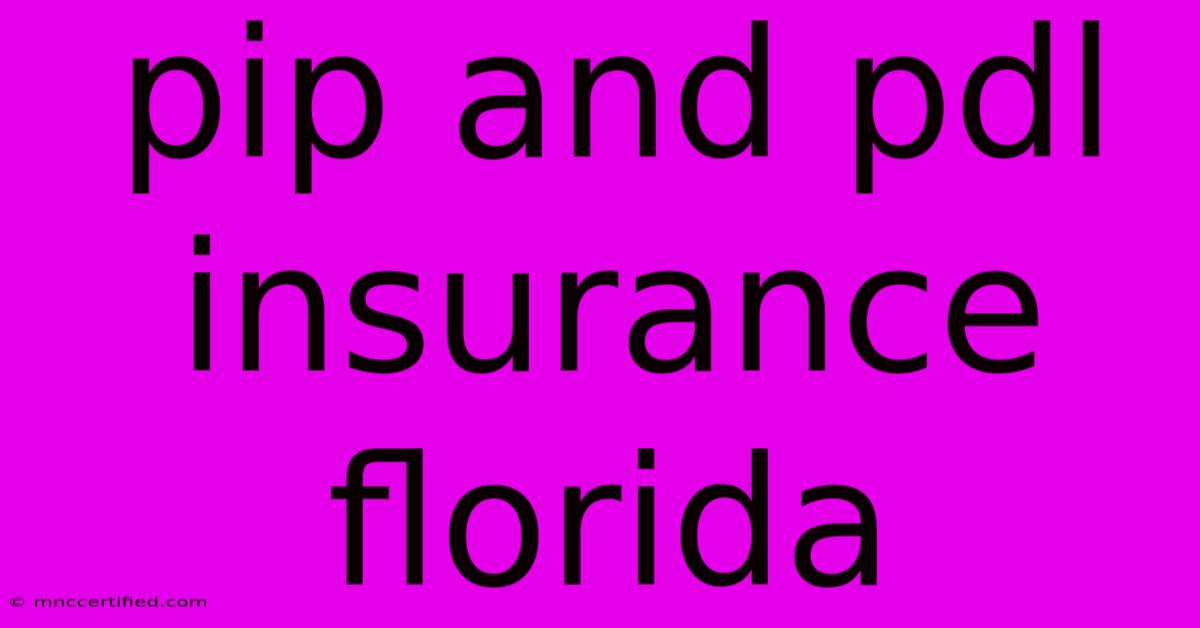Pip And Pdl Insurance Florida

Table of Contents
Understanding PIP and PDL Insurance in Florida: A Comprehensive Guide
Florida's insurance landscape can be complex, especially when it comes to Personal Injury Protection (PIP) and Property Damage Liability (PDL). This comprehensive guide will clarify these crucial aspects of Florida auto insurance, helping you understand your coverage and navigate potential claims.
What is PIP Insurance in Florida?
PIP, or Personal Injury Protection, is a no-fault insurance coverage mandated in Florida. This means that regardless of who caused the accident, your PIP coverage will pay for your medical bills and lost wages up to your policy limits. It's a crucial safety net, providing immediate financial assistance after a car accident.
Key features of Florida PIP coverage:
- Medical benefits: Covers 80% of your reasonable medical expenses, including doctor visits, hospital stays, surgery, and rehabilitation. The remaining 20% is your responsibility.
- Lost wage benefits: Covers 80% of your lost wages due to the accident, up to a specified limit.
- Death benefits: Provides a death benefit to your beneficiaries in the event of a fatal accident.
- Coverage for passengers: Your PIP coverage extends to passengers in your vehicle, regardless of fault.
Understanding PIP Limitations
While PIP is beneficial, it's vital to understand its limitations:
- Policy limits: PIP coverage has a financial limit, usually ranging from $10,000 to $100,000. Once this limit is reached, your PIP coverage is exhausted.
- 80/20 rule: Remember, PIP only covers 80% of your medical bills and lost wages.
- Time limits: There are time limits for submitting claims and receiving benefits.
What is PDL Insurance in Florida?
PDL, or Property Damage Liability, covers the cost of repairing or replacing another person's vehicle or property damaged in an accident you caused. It's a crucial part of your auto insurance policy, protecting you from significant financial liability.
Key aspects of PDL coverage:
- Covers damages to other vehicles: If you cause an accident and damage another vehicle, your PDL coverage will pay for the repairs.
- Covers damages to other property: This extends beyond vehicles to include fences, buildings, or other property damaged due to your negligence.
- Liability protection: PDL protects you from being held financially responsible for the damages you caused.
Understanding PDL Limitations
Similar to PIP, PDL has limitations:
- Policy limits: PDL coverage has a specified limit, typically ranging from $10,000 to $100,000 or more.
- Exclusions: PDL typically doesn't cover damages to your own vehicle or property. This is where collision and comprehensive coverage comes into play.
PIP and PDL: Working Together
While distinct, PIP and PDL often work in tandem after an accident. Your PIP coverage handles your medical bills and lost wages, while your PDL coverage addresses damages to the other party's vehicle or property.
Filing a Claim for PIP and PDL
Filing a claim requires prompt action. Contact your insurance company immediately after the accident, gather necessary information (police report, witness statements, photos), and follow your insurer's claim procedures.
Choosing the Right PIP and PDL Coverage
The amount of PIP and PDL coverage you need depends on your individual circumstances and risk tolerance. Consult with an insurance professional to determine the appropriate coverage levels for your needs. Consider factors such as your driving history, the value of your vehicle, and your financial situation.
Frequently Asked Questions (FAQs)
Q: What happens if my PIP coverage runs out?
A: If your PIP benefits are exhausted, you may need to pursue a claim against the at-fault driver's liability insurance or file a lawsuit.
Q: Can I sue someone even if I have PIP coverage?
A: In Florida, you can sue the at-fault driver for pain and suffering and other damages above and beyond your PIP coverage, if the other driver is at fault. There's a threshold for pain and suffering claims, which means you must meet a certain level of injury before you can file a lawsuit against the at-fault driver.
This comprehensive guide provides a solid understanding of PIP and PDL insurance in Florida. Remember, this information is for educational purposes, and consulting with an insurance professional is always recommended for personalized advice. Understanding your coverage is key to protecting yourself and your finances after a car accident.

Thank you for visiting our website wich cover about Pip And Pdl Insurance Florida. We hope the information provided has been useful to you. Feel free to contact us if you have any questions or need further assistance. See you next time and dont miss to bookmark.
Featured Posts
-
Iman Insurance Contact Number
Nov 29, 2024
-
Go Auto Insurance Gonzales La
Nov 29, 2024
-
Estrella Insurance Cape Coral
Nov 29, 2024
-
Shelter Insurance Montrose Co
Nov 29, 2024
-
Insurance Vehicle Class Codes
Nov 29, 2024